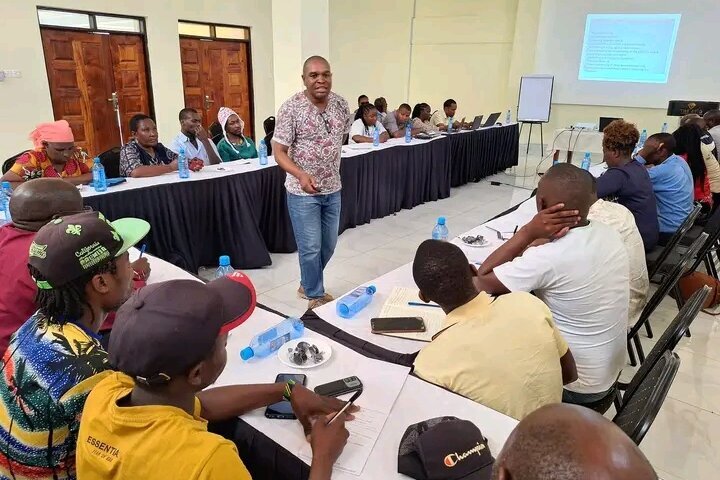Taita Taveta community members living near forests trained on conservation

FAO officials, Taita Taveta County Government officials, and members of Community Forest Associations (CFAs) from Chawia and Vuria attend a training session. Courtesy photo
In a bid to empower communities living close to forested areas, 40 members of the Community Forest Associations (CFAs) from Chawia and Vuria in Taita Taveta have undergone intensive training on forest management and sustainable conservation practices.
The five-day workshop, sponsored by the African Wildlife Foundation (AWF), focused on capacity building to promote nature-based enterprises and enhance environmental stewardship.
Speaking at the closing of the workshop, the Taita Taveta County Executive Committee Member (CECM) for Water, Sanitation, Environment, Climate Change, and Natural Resources--Grantone Mwandawiro--emphasized the significance of equipping communities with the knowledge and tools needed to manage their forests sustainably.
“We have seen how empowering these communities leads to more effective conservation efforts. When people living close to forests understand their value, they become better custodians,” Mr Mwandawiro said.
Adding that by creating nature-based enterprises like agroforestry, bee-keeping, and eco-tourism, communities can protect the environment while also boosting their livelihoods.
The workshop, which took place at the County’s training facility, focused on the sustainable use of forest resources and improving the governance structures within the CFAs.
The communities have a critical role to play in conserving the county’s natural resources, which include forests that are vital water sources for both human and wildlife populations in the region.
The outgoing County Forest Conservator Peter Mwangi highlighted the importance of strengthening community governance in forest management.
“Through this training, the CFAs can now implement their Participatory Forest Management Plans (PFMPs) effectively. The groups are now more equipped with leadership skills, governance knowledge, and resource mobilization strategies,” Mr Mwangi said.
Mwangi noted that the CFAs had also received training on conflict management and proposal writing, key skills for addressing conservation challenges and securing funding for environmental projects.
“We believe these newly acquired skills will lead to better implementation of forest management plans, resulting in healthier and more sustainable forests," he said.
Senior Officer for Conservation Education at AWF Margaret Mereyian spoke about the critical role that CFAs play in forest protection.
“Forests are not just beautiful landscapes. They are essential ecosystems that support both human and wildlife populations,” Ms Mereyian explained.
Adding that their goal is to ensure that communities living near forests are actively involved in protecting and managing these areas.
"By working closely with the County Government of Taita Taveta, we aim to align our efforts with national laws and regulations for forest conservation.”
She further emphasized the importance of partnerships between local communities, non-governmental organisations, and the government in ensuring the sustainable use of forest resources.
“Through these partnerships, we can combat illegal activities such as logging and charcoal burning, which continue to threaten forest cover,” Ms Mereyian added.
The CECM also highlighted the county’s plans to introduce laws aimed at regulating and combating illegal logging, a persistent problem in many parts of the region.
"The government is keen on creating legislation that will protect our forests and encourage sustainable land use practices. Our goal is to increase the county's forest cover, and this will require cooperation from all stakeholders,” Mr Mwandawiro said.
CFA member David Mutua Vuria said they have learned how to work together as a group and how to create a sustainable income through forest-friendly activities.
"This knowledge will help us not only protect our forests but also support our families," Mr Vuria said.
The training also saw the participation of organisations like CIFOR-ICRAF and the Food and Agriculture Organisation (FAO), who shared valuable insights on integrating climate-smart practices into community-based forest management.
The workshop is part of a broader initiative to engage local communities in the sustainable management of the county’s rich biodiversity. Taita Taveta’s forests, which include the Chawia and Vuria forests, are home to numerous species of wildlife and plants and play a critical role in the water cycle of the region.
The CECM expressed optimism about the future of forest conservation in the county.
“This training marks the beginning of a long-term effort to involve local communities in protecting their environment. We are committed to ensuring that the knowledge gained here translates into tangible conservation efforts,” Mr Mwandawiro said.

Be the First to Comment